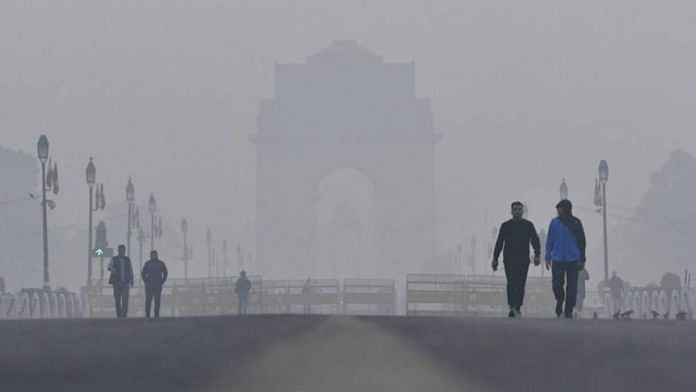New Delhi: India is currently the country with the worst air pollution in the world (according to concentration levels of pollutants in 2019), with air pollution shortening life expectancies by nearly six years on average, a new study has found. In Delhi and Uttar Pradesh, the number of years one is losing from one’s life on average because of air pollution goes up to 9.7 and 9.5 years, respectively.
By contrast, the average global citizen loses 2.2 years of life to air pollution, according to 2019 concentration levels.
The above findings are part of a global Air Quality Life Index prepared by the Energy Policy Institute at the University of Chicago. According to the index, released Wednesday, “In 2019, India’s average particulate matter concentration was 70.3 μg/m3 (micrograms per cubic metre) – the highest in the world and 7 times the WHO’s guideline of 10 μg/m3″.
The index based its calculations of life expectancy on peer-reviewed studies, which stated that each additional 10 μg/m3 of PM2.5 exposure reduces life expectancy by 0.98 years.
PM2.5 refers to the size of particulate matter, a byproduct of fossil fuel burning, that is suspended in the air. Apart from accelerating global warming, these particles can penetrate the lungs and enter the bloodstream, causing lung disease, cancer, strokes, and heart attacks.
“The AQLI data is yet another warning that the stakes are higher than ever to reduce fossil fuel emissions,” said the researchers, adding, “Working unseen inside the human body, the deadly effects of PM2.5 on the heart, lungs, and other systems have a more devastating impact on life expectancy, than communicable diseases like tuberculosis, behavioral killers like cigarette smoking, and even war”.
Also read: India’s poor face disproportionately higher risk of dying from air pollution than the rich — study
Pollution in India ‘not seen’ in any other country
According to the index, over the South Asian Region, which includes India, Pakistan, Nepal, and Bangladesh, people lose 5.6 years of life expectancy on average to high levels of PM2.5 levels.
About 40 per cent of India’s population lives in the Indo-Gangetic plains, where pollution levels are much higher than the country’s average, and are “on track to lose 8.5 years of life expectancy on average, if pollution levels persist”, it added.
In Kolkata, residents are projected to lose more than nine years of life expectancy if 2019 concentrations persist, and in cities like Lucknow, this number goes up to 11.1 years.

In no Indian state or union territory (UT) was the extent of air pollution within the WHO’s standards of acceptable PM2.5 levels, with Ladakh, the country’s cleanest among all states and UTs, having concentrations of 12 μg/m3. States with the worst PM2.5 levels, according to the index are Bihar (100 μg/m3), the National Capital Territory (109 μg/m3), and Uttar Pradesh (107 μg/m3).
Industrialisation, economic development, and population growth over the last two decades “have led to skyrocketing energy demand and fossil fuel use across the region. In India and Pakistan, the number of vehicles on the road has increased about four-fold since the early 2000s,” the index stated, adding, “Had pollution levels in 2000 remained constant over time, the residents in these countries would be on track to lose 4.8 years of life expectancy— not the near 6 years that they stand to lose today.”
However, according to the researchers, measures like the Indian government’s National Clean Air Programme (NCAP), which aims to reduce the particulate pollution levels of 2017 by 20 to 30 per cent by the year 2024, can help reverse the effects of air pollution on life expectancy.
“Although the NCAP targets are non-binding, achieving and sustaining such a reduction would increase India’s national life expectancy by as much as 1.7 years, and by as much as 3.1 years for residents of Delhi,” the index added.
Also read: Air pollution from fossil fuels causes over 30% deaths in India every year: Harvard study
China a ‘role model’
To put the danger air pollution poses in perspective, air pollution reduces global life expectancy by 2.2 years, which is more than that lost because of smoking (1.8 years), alcohol use (seven months), unsafe water and sanitation (seven months), HIV/AIDS (four months), malaria (three months), and conflict and terrorism (18 days).
“Air pollution is so deadly because, for the majority of people living in polluted countries, it is nearly impossible to avoid,” stated the index.
China, researchers say, makes for a good “model of progress.” China has been primarily responsible for the decline in global pollution concentrations since 2011.
“Since 2013, particulate pollution in China has declined by 29 per cent, adding about 1.5 years onto average life expectancy assuming these reductions are sustained,” the index added.
(Edited by Poulomi Banerjee)
Also read: Air pollution caused 16.7 lakh deaths, Rs 2.71 lakh crore loss in India in 2019 — Lancet study



